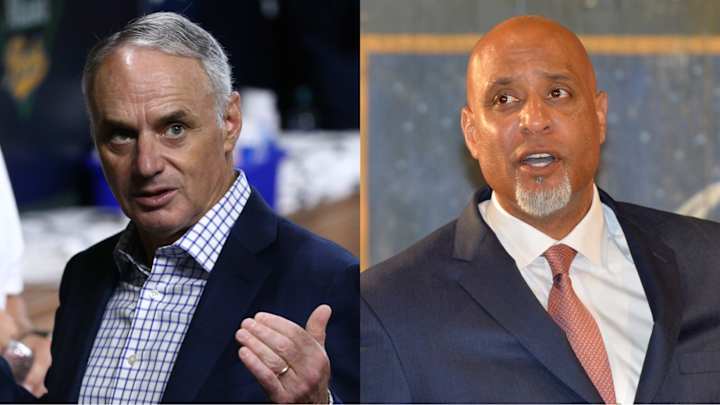Report: MLB's Latest CBA Proposal Rejected By MLBPA As Lockout Continues

In the first bargaining session since baseball's ninth work stoppage began on Dec. 2, Major League Baseball (MLB) made a proposal to the MLB Players Association (MLBPA) that was rejected Thursday, according to ESPN's Jeff Passan.
The rejection of the deal was expected, and the reaction of the players association was not considered to be positive. It is not yet clear how soon the MLBPA will counter the proposal. However, ESPN reported it will likely be sooner than later.
According to multiple reports, the proposal would award draft picks to teams that wouldn't manipulate the service of top prospects and modify the league minimum salary to a tiered system based on service time, paying players between $600,000 and $700,000. Thursday's proposal also included the creation of the universal designated hitter and a 14-team playoff, which the league has pushed for since bargaining started.
According to The Athletic, the most notable change that MLB proposed was the elimination of the salary arbitration process for Super Two players—the small group of players with more than two years of MLB service who qualify for salary arbitration. Instead, MLB offered to pay those players based on a formula, while keeping the current arbitration system for players with three to five years of service time.
According to MLB Network's Jon Heyman, the MLBPA was not satisfied with the proposed formula for players with two-plus years of service. While the league viewed the change as significant, the players thought it as incremental at best.
In addition, players were very disappointed that the league chose not to include any changes to the Competitive Balance Tax threshold or free agency—two areas that are very important to the MLBPA. Per Heyman, MLB's position in this proposal was to address the issue of better compensation for younger players—another important issue to the MLBPA—and provide momentum for future bargaining sessions where the CBT and free agency can be discussed.
It's important to note for future bargaining sessions that MLB commissioner Rob Manfred has spoken out against any changes to revenue sharing or players needing less time to qualify for free agency.
While it was virtually expected for Thursday's proposal to gain little traction, it still threatens the idea of spring training beginning on time. Pitchers and catchers are supposed begin reporting to camps in roughly one month, and there is much to be accomplished after a new CBA is signed and regular MLB business can resume.
Well more than 100 free agents need time to sign with clubs, players from outside the United States will need time to renew their visas and clubs have a slew of offseason objectives to tackle, including the trade market, salary arbitration and potentially the big league portion of the Rule 5 draft. In addition, the rising cases of COVID-19 will warrant a long and extensive look at establishing protocols to keep players and staff as safe as possible.
While the start of spring training is beginning to be threatened, it is far too early to fear for any delay to the regular season. According to multiple reports, the season can still begin on time if a new agreement is signed by early March.
Make sure to like SI's 'Inside The Rangers' on Facebook
